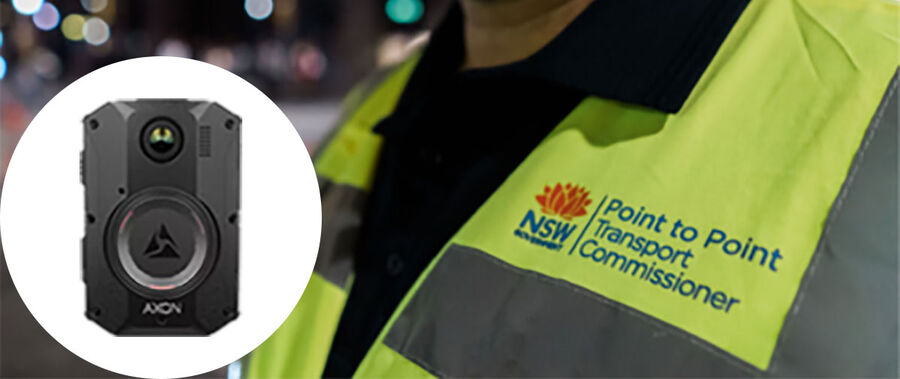Project overview
The Point to Point Transport Commissioner is committed to ensuring a safer point to point transport industry for passengers, drivers, the public and everyone involved in the industry, including Commission staff.
A limited trial of body-worn video cameras was conducted by the Commission, underpinned by the Commissioner's strategic priorities which aim to support safe point to point transport services being delivered in NSW. This trial was positive and has been expanded across all on street activities across the state and the expanded trial is expected to be completed by the end of 2024.
The use of body-worn video cameras has reportedly provided safety benefits for law enforcement officers in various situations. The Commissioner’s Authorised Officers trialled this technology when conducting field compliance activities to evaluate their effectiveness in supporting the safety of the Authorised Officer as well as drivers and the public. This trial has now successfully concluded with the body-worn video cameras implemented as standard procedure in all on street activities across the state.
Body-worn cameras may assist in de-escalating potential safety risks and support written records required by Authorised Officers, providing an additional source of information or evidence. The limited trial aims to evaluate whether the Commission should proceed to a full trial of body-worn video cameras. This will include evaluating:
- Safety outcomes from the use of the cameras
- The quality of the footage captured and whether it adds value to written records
- The Authorised Officers’ feedback on the use of the cameras, including when they used them, the reactions of persons recorded and the time spent handling the cameras and any footage appropriately
FAQs
Will the footage captured be secured?
Body-worn video camera recordings will be securely stored, archived and disposed of in accordance with the State Records Act 1998 disposal authorities.
The Commission will be utilising a secure and auditable web-based video management system to process and manage body-worn video camera recordings. This platform uses secure servers, encryptions and varying levels of access to ensure the security and safe custody of data.
Can footage captured by body-worn video cameras be supplied as evidence in court?
Footage from body-worn video camera recordings may be disclosed for the purposes of law enforcement, court proceedings and as otherwise authorised by law.
The disclosure of footage must be approved by the Commission's Director, Compliance on a case-by-case basis.
If a driver doesn’t consent to an Authorised Officer using the body-worn video camera, will the Authorised Officer continue recording?
In the majority of circumstances, the Authorised Officer will either not commence recording or terminate any recording that has started.
If the Authorised Officer believes the matter to be an immediate safety risk to themselves or any other person, they may choose to proceed with recording even if a driver does not consent or withdraws their consent.
Who else must give consent?
Authorised Officers do not need consent to record in a public area, therefore, if an Authorised Officer perceives an immediate safety risk, they may commence recording. An immediate safety risk is defined as a hazardous situation that could lead to an immediate risk to the health and safety of an Authorised Officer, driver, passenger, or other person connected with the passenger service being provided or the regulation of that service.
The Authorised Officer will inform anyone who is the subject of the recording that a body-worn video camera is being used, as soon as practicable after recording has commenced. The subject can withdraw their consent and the Authorised Officer will stop the recording, unless the Authorised Officer believes the matter to be an immediate safety risk to themselves or any other person.
How can the body-worn video camera recordings be accessed?
Access to body-worn video camera recordings is restricted to the Commissioner’s Authorised Officers as well as project team members assessing the limited trial.
